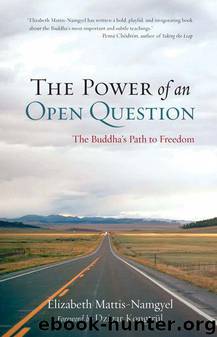The Power of an Open Question: A Buddhist Approach to Abiding in Uncertainty by Mattis-Namgyel Elizabeth

Author:Mattis-Namgyel, Elizabeth [Mattis-Namgyel, Elizabeth]
Language: eng
Format: azw3
Publisher: Shambhala Publications
Published: 2010-09-17T03:00:00+00:00
Why can’t the world reach a state of peaceful equilibrium? Why can’t we fix things? Simply because we can’t pin things down . . . they are too complex.
My friend Kelly says that when she listens to the news she hears so much conflicting information she can’t truly reach a conclusion about anything—a common experience. Usually we see this as a problem. Our inability to reach conclusions makes us feel ignorant and helpless. We feel pressured to sort it all out.
But think about this: maybe experiencing complexity brings us closer to reality than does thinking we’ve actually figured things out. False certainty doesn’t finalize anything. Things keep moving and changing. They are influenced by countless variables, twists and turns . . . never for a moment settling into thingness.
So maybe we should question the accuracy or limitations of this kind of false certainty. Conflicting information confuses us only when we’re trying to reach a definite conclusion. But if we’re not trying to reach a conclusion in the first place—if we just observe and pay attention—we may actually have a fuller, more accurate reading of whatever we encounter. Let me give you an example.
In the movie Dead Man Walking, Sean Penn plays a disturbed young man who, with his equally disturbed friend, rapes a young woman and then goes on to kill her and her boyfriend. The movie follows him to his death by lethal injection. Meanwhile, it also follows the families of the victims, some of whom support his death sentence and others who don’t. This movie takes a subject—the difficult subject of capital punishment—and looks at it from all angles. It never divides. It never deifies or vilifies anyone—as most Hollywood productions do. It never once reaches a conclusion. It simply looks at and lets you feel each point of view. Because it withholds all judgment in this way, I found myself walking out of the movie theater with a deep faith in human nature.
The genius of this movie is that it allows the viewer to feel tenderness for every single one of the characters—including the guilty protagonist. This kind of approach engages our deepest intelligence. It shows us that we can know things without reifying them; that we don’t have to take a side in order to access our discerning intelligence; that we can function from a wide-open mind; that, in fact, our intelligence and compassion increase with receptivity.
In the Middle Way tradition, a philosophical school called the Prasangika Madhyamika turns “not taking a side” into a practice. The proponents of this school never make conclusive statements or take doctrinal stances. Instead they question their opponents’ views and draw out the faults and inconsistencies of their arguments. Because Prasangika scholars don’t reach conclusions about things, no one can trump them in debate. Yet their process of questioning brings everyone involved to a place of great openness and clarity.
FUNDAMENTALISM
Download
This site does not store any files on its server. We only index and link to content provided by other sites. Please contact the content providers to delete copyright contents if any and email us, we'll remove relevant links or contents immediately.
The Way of Zen by Alan W. Watts(6589)
Ego Is the Enemy by Ryan Holiday(5406)
The Art of Happiness by The Dalai Lama(4118)
The Book of Joy by Dalai Lama(3965)
Why Buddhism is True by Robert Wright(3439)
Spark Joy by Marie Kondo(3293)
Shift into Freedom by Loch Kelly(3190)
Happiness by Matthieu Ricard(3037)
A Monk's Guide to a Clean House and Mind by Shoukei Matsumoto(2901)
The Lost Art of Good Conversation by Sakyong Mipham(2638)
The Meaning of the Library by unknow(2560)
The Unfettered Mind: Writings from a Zen Master to a Master Swordsman by Takuan Soho(2293)
The Third Eye by T. Lobsang Rampa(2255)
Anthology by T J(2202)
Red Shambhala by Andrei Znamenski(2180)
The Diamond Cutter by Geshe Michael Roach(2057)
Thoughts Without A Thinker: Psychotherapy from a Buddhist Perspective by Epstein Mark(2007)
Twilight of Idols and Anti-Christ by Friedrich Nietzsche(1886)
Advice Not Given by Mark Epstein(1874)
